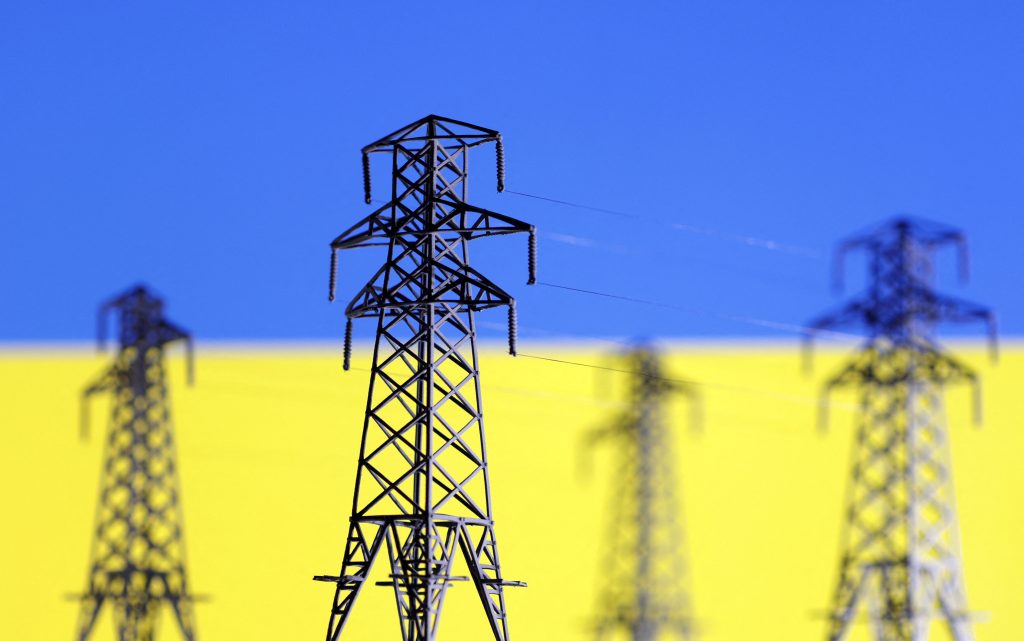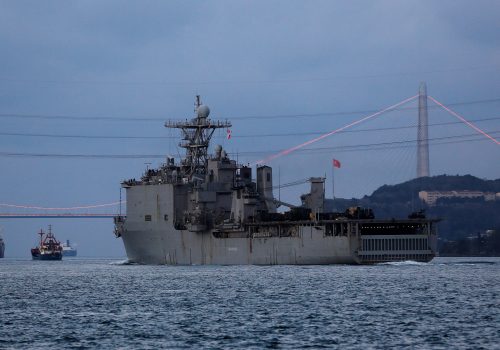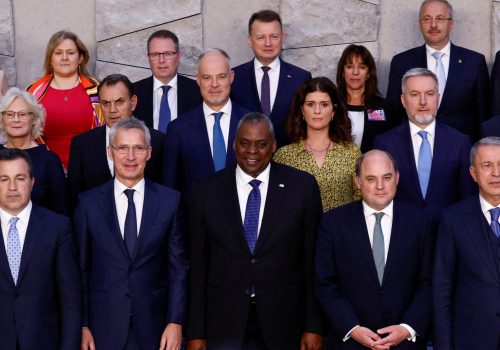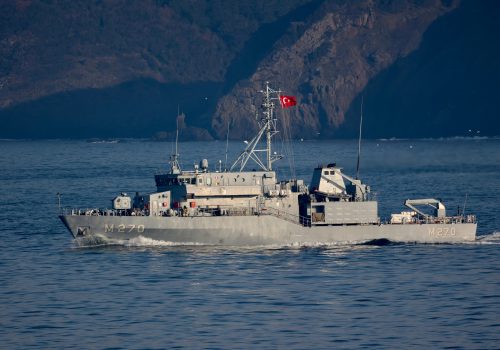Russian attacks on Ukraine’s infrastructure in recent months have highlighted the devastating impact of twenty-first-century warfare and the resulting vulnerability of civilian life. A major component of modern warfare is the hybrid threat, in which Russia is a most aggressive perpetrator.
Indeed, the Kremlin effectively implemented hybrid warfare in the 2014 annexation of Crimea and continues to use similar tactics to influence political outcomes in Moscow’s favor. Hybrid warfare, which includes cyberwar and malign influence, allows states and non-state actors to impact the political stability of adversaries with limited or no use of conventional military forces. This is significant as it gives states, as well as terrorist and criminal organizations, a low-cost method to influence the politics and policies of other states or even capture territory.
An important aspect of hybrid warfare is the ability to attack and disrupt civilian infrastructure—in particular the power grid and fuel distribution systems that form the backbone of a country’s energy sector. One only has to remember the persistent Russian attacks on Ukraine’s energy infrastructure, starting with the December 2015 cyberattack using the BlackPower malware. More recently, the Colonial Pipeline ransomware hack in the United States in May 2021 also served as a glaring example of this phenomenon.
The battlefield setbacks in Ukraine notwithstanding, Russia’s cyber-military dominance looms over the wider Black Sea region, particularly among the smaller states of NATO and its Partnership for Peace (PfP) program that have limited resources and vulnerable energy infrastructures. The Russian war in Ukraine has created conditions that demand greater NATO attention to this dynamic, particularly in what is called operational energy—the energy needed to perform military operations.
It is imperative that national security experts continue to analyze this vital field and concentrate on developing NATO’s operational energy capabilities, resilience, and interoperability.
- Capability refers to the requirements NATO must focus on to meet its objectives and operate more effectively and efficiently in an energy-constrained environment. Enhanced capabilities can take the form of strengthening NATO’s intelligence, surveillance, and reconnaissance, as well as its cyber defense. This includes advanced warning technologies and streamlined strategic communications. This concept aligns closely with the NATO Defense Planning Process, an analytic framework that matches capabilities to mission requirements.
- Resilience is the ability of NATO member states collectively or individually to deter, detect, withstand, and recover from a variety of hybrid tactics launched against their energy infrastructure. Greater resilience would allow NATO members to take a blow to the energy sector and recover in a timely manner. They should consider hardening energy sector assets as much as possible, as well as creating alternate supply chains. Additionally, this should entail a deeper assessment of malign influence in the energy sector.
- Interoperability permits member states to interact seamlessly in different environments, conditions, and platforms. It allows member states to work more efficiently together and operate under an agreed set of NATO standards, with the aim of building familiarity and a common operating picture. This is accomplished through continual interaction between Alliance members and PfP members, notably through joint exercises and NATO/PfP engagement.
Preparing for the future
In October, the NATO Science and Technology Board authorized the formation of Systems Analysis and Studies (SAS)-183, entitled “Energy Security and Building Capabilities, Resilience and Interoperability.” I serve as chair of this effort. It is a continuation of the predecessor study, SAS-163, “Energy Security in the Era of Hybrid Warfare,” which concluded in December. The new study, scheduled to commence this month, will concentrate on cross-cutting analyses highlighting the themes of capability, resilience, and interoperability with a focus on the Black Sea, Baltic Sea, and Arctic Sea. Attention will be particularly devoted to the Black Sea, which is at the center of the current military conflict between Russia and Ukraine, and which deserves priority focus.
Another area of concentration in SAS-183 is advanced early warning cyber defense, whereby the study’s cyber team will create a prototype to improve maritime security by protecting critical energy infrastructure from cyberattacks. The study will integrate exercise results into its final analysis. The study’s authors recognize the importance of exercises as cost-effective ways to prepare for and respond to a variety of kinetic and non-kinetic contingencies, and for this reason, we anticipate more reliance on exercise results. For instance, in the previous study, SAS-163, team members contributed to several NATO and PfP member state exercises, and those of us working on SAS-183 anticipate continuing this activity.
SAS-183 will include numerous subject matter experts representing nearly a dozen NATO members, PfP states, and organizations, indicating the importance with which the Alliance and its partners view the growing challenge. Ultimately, the study will provide enhanced regional analysis, greater insight into cyber early-warning technologies, and a deeper assessment of the continued threat posed to NATO member state security by the threat of hybrid warfare on the energy sector.
As the Kremlin and other NATO foes look to evolve their hybrid warfare practices, especially given the Alliance’s superior capabilities in the traditional military sphere, such forward-looking research is vital. Russia’s shifting tactics in Ukraine, as seen by its deliberate attacks on energy infrastructure, offer a window to the future of warfare. NATO must stay several steps ahead.
Arnold C. Dupuy is a nonresident senior fellow at the Atlantic Council IN TURKEY, a faculty member of the US Naval Postgraduate School, and chair of the NATO Science and Technology Organization’s SAS-183, “Energy Security Capabilities, Resilience and Interoperability.”
Further reading
Thu, Sep 1, 2022
To re-engage in the Black Sea, the US must look to Turkey
TURKEYSource By Arnold C. Dupuy
Russia’s invasion of Ukraine presents an opportunity for the United States to re-engage in the Black Sea region. To do so, it will need to work with partners and allies, such as Turkey.
Fri, Jun 24, 2022
Turkey and NATO are stronger with each other. They must de-thorn their relationship.
New Atlanticist By
Irritants that have weighed down the relationship between Ankara and its allies must be addressed sooner than later.
Thu, May 12, 2022
Energy security is critical to NATO’s Black Sea future
TURKEYSource By Arnold C. Dupuy
Russia's invasion of Ukraine demonstrates the fragility of energy security in the Black Sea region, which NATO should address.
Image: Electric power transmission miniatures are seen in front of displayed Ukrainian flag in this illustration taken, December 5, 2022. REUTERS/Dado Ruvic/Illustration



